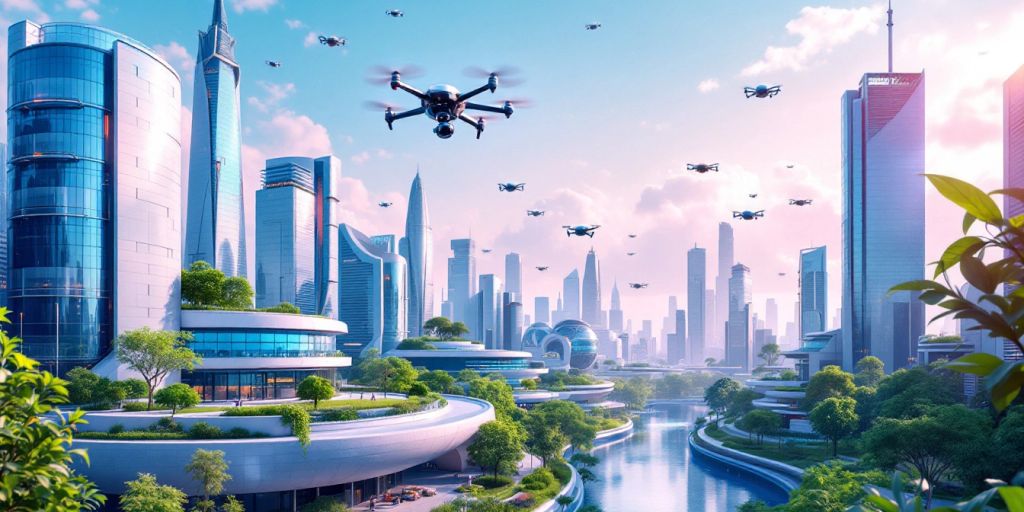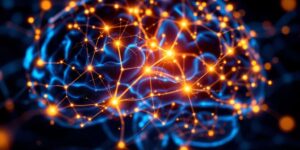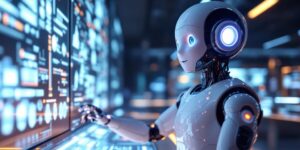
Artificial Intelligence (AI) is changing the world in many exciting ways. From how businesses operate to how we create art, AI is making a big impact. OpenAI is at the center of this change, helping to shape technology for the future. In this article, we will explore how OpenAI is influencing different areas and what it means for us today and tomorrow.
Key Takeaways
- OpenAI has played a major role in AI’s growth since its start in 2015.
- AI is transforming how businesses work, making tasks quicker and easier.
- Ethics in AI is crucial, focusing on fairness and privacy.
- AI is changing creative fields like art and music, opening new possibilities.
- The future of AI in healthcare looks promising, with better diagnosis and patient care.
The Evolution of AI Open AI
Historical Milestones in AI Development
OpenAI has made significant strides in the field of artificial intelligence since its founding in 2015. The organization was created to ensure that AI benefits humanity while being developed safely. Here are some key milestones:
- 2015: OpenAI is established as a nonprofit.
- 2019: Release of GPT-2, showcasing advanced language processing.
- 2020: Launch of GPT-3, further enhancing AI’s language capabilities.
The Role of Open AI in Advancing AI
OpenAI plays a crucial role in pushing the boundaries of AI technology. Its research has led to:
- Development of large language models.
- Innovations in robotics and machine learning.
- Collaborations with major tech companies to explore AI applications.
Key Innovations and Breakthroughs
OpenAI has introduced several groundbreaking technologies that have transformed various sectors. Some notable innovations include:
- AI in healthcare: Tools for medical diagnosis.
- Educational AI assistants: Enhancing learning experiences.
- AI for climate change: Strategies to combat environmental issues.
OpenAI’s commitment to responsible AI development is evident in its collaboration with policymakers and the public, ensuring that AI technologies are developed ethically and transparently.
AI Open AI in Business Automation

Transforming Business Processes
AI is changing how businesses operate. Many companies are using AI to automate tasks, which helps them save time and money. Here are some ways AI is transforming business processes:
- Automating repetitive tasks like data entry.
- Using chatbots to handle customer inquiries.
- Analyzing data to find trends and insights.
Enhancing Decision-Making with AI
AI helps leaders make better decisions by providing quick insights from large amounts of data. Instead of spending hours looking through reports, managers can:
- Get instant summaries of important data.
- Use AI tools to predict future trends.
- Make informed choices based on real-time information.
The Future of AI-Powered Customer Service
AI is set to revolutionize customer service. With tools like chatbots and virtual assistants, businesses can:
- Provide 24/7 support to customers.
- Personalize interactions based on customer data.
- Quickly resolve issues without human intervention.
AI is not just about replacing jobs; it’s about making work easier and more efficient. As AI continues to grow, it will create new opportunities for businesses and employees alike.
In summary, AI is reshaping business automation by streamlining processes, enhancing decision-making, and improving customer service. The impact of OpenAI in this area is significant, as it leads to more efficient and effective business operations.
Ethical Considerations in AI Open AI Development
Addressing Privacy Concerns
AI systems often require large amounts of data to function effectively. This raises important questions about how personal information is collected and used. Protecting user privacy is crucial. Here are some key points to consider:
- Companies must be transparent about data collection practices.
- Users should have control over their own data.
- Regulations should be in place to protect sensitive information.
Ensuring Fairness and Reducing Bias
AI can sometimes reflect or even amplify existing biases in society. To combat this, developers need to:
- Regularly test AI systems for bias.
- Use diverse datasets to train AI models.
- Involve a variety of voices in the development process.
The Importance of Transparency and Accountability
Transparency in AI development helps build trust. It’s essential for:
- Developers to share how AI models work.
- Users to understand the decisions made by AI.
- Establishing clear guidelines for accountability when AI systems fail.
In the rapidly evolving world of AI, ethical considerations must be at the forefront to ensure technology benefits everyone.
AI Open AI in Creative Industries
AI in Art and Music
Artificial intelligence is changing how we create and enjoy art and music. New technologies are rapidly shaping how people create and consume arts and culture. Here are some ways AI is influencing these fields:
- Generative Art: AI can create unique pieces of art based on various styles.
- Music Composition: AI tools can help musicians compose new songs or enhance existing ones.
- Interactive Experiences: AI can create immersive experiences in galleries and concerts.
Revolutionizing Content Creation
AI is also transforming how we produce content. It allows creators to:
- Generate ideas quickly.
- Edit and refine their work more efficiently.
- Analyze audience preferences to tailor content.
The Impact on Digital Marketing
In digital marketing, AI is making a significant impact by:
- Personalizing user experiences based on data.
- Automating ad placements and targeting.
- Analyzing trends to optimize campaigns.
AI is not just a tool; it’s a partner in creativity, helping artists and marketers push boundaries and explore new possibilities.
The Future of AI Open AI in Healthcare
AI-Powered Medical Diagnosis
AI is changing how doctors diagnose diseases. With advanced algorithms, AI can analyze medical images and data faster than humans. This helps in identifying conditions like cancer early, which can save lives. Here are some key benefits of AI in medical diagnosis:
- Faster analysis of medical images
- Higher accuracy in detecting diseases
- Reduced workload for healthcare professionals
Improving Patient Care with AI
AI tools are being used to enhance patient care. They can monitor patients’ health in real-time and alert doctors if something is wrong. Some ways AI improves patient care include:
- Personalized treatment plans based on patient data
- Predictive analytics to foresee health issues
- Virtual health assistants for patient queries
AI in Drug Discovery and Development
AI is also speeding up the process of discovering new medicines. By analyzing vast amounts of data, AI can identify potential drug candidates much quicker than traditional methods. The advantages of using AI in drug development are:
- Reduced time to market for new drugs
- Lower costs in research and development
- Increased success rates in clinical trials
The integration of AI in healthcare is not just about technology; it’s about improving lives and making healthcare more accessible for everyone.
Challenges and Opportunities for AI Open AI

Job Displacement and Workforce Reskilling
The rise of AI technologies brings significant challenges to the job market. Many jobs may be automated, leading to displacement. To address this, we need to focus on:
- Reskilling workers for new roles.
- Promoting lifelong learning programs.
- Encouraging industries to adapt to AI integration.
Balancing Innovation with Regulation
As AI continues to evolve, finding the right balance between innovation and regulation is crucial. Key points include:
- Establishing clear guidelines for AI development.
- Ensuring that regulations do not stifle creativity.
- Involving various stakeholders in the regulatory process.
The Potential for AI to Address Global Issues
AI holds the promise to tackle some of the world’s biggest challenges. Some areas where AI can make a difference are:
- Healthcare improvements, such as early diagnosis.
- Environmental sustainability through better resource management.
- Enhancing education by personalizing learning experiences.
The future of AI is bright, but it requires careful navigation of its challenges to unlock its full potential.
In summary, while OpenAI faces big challenges like job displacement, it also has opportunities to innovate responsibly and address global issues effectively.
Collaborative Efforts and Open AI Research
OpenAI recognizes the importance of teamwork in advancing artificial intelligence. Collaborations with various organizations have led to significant breakthroughs in AI technology. Here are some key areas of focus:
Partnerships with Academic Institutions
- OpenAI collaborates with universities to share knowledge and resources.
- They support research projects and host workshops to foster innovation.
- These partnerships help OpenAI stay at the forefront of AI research.
Open-Source AI Projects
- OpenAI promotes open-source initiatives to encourage community involvement.
- This approach allows developers to contribute to AI advancements.
- Open-source projects help in creating transparent and accessible AI tools.
The Role of Community in AI Development
- Community engagement is crucial for responsible AI development.
- OpenAI seeks feedback from users and experts to improve its technologies.
- This collaboration helps ensure that AI aligns with human values and needs.
| Partnership Type | Example Project | Impact |
|---|---|---|
| Academic Collaboration | Research on AI ethics | Improved understanding of AI implications |
| Industry Partnership | AI for healthcare applications | Enhanced medical diagnosis capabilities |
| Open-Source Initiative | Development of AI tools for education | Increased accessibility to AI resources |
OpenAI’s commitment to collaboration is evident in its partnerships, which drive innovation and ensure that AI benefits everyone.
Through these collaborative efforts, OpenAI is shaping the future of AI, making it more effective and responsible for society.
Conclusion
In summary, the future of technology is being shaped significantly by AI, especially through the work of OpenAI. As we look ahead, it’s clear that AI will play a vital role in many areas of our lives, from how we work to how we learn and interact. While there are challenges to address, like job changes and privacy concerns, the potential benefits are enormous. OpenAI is leading the way in making sure that AI is developed safely and responsibly. By focusing on ethics and collaboration, they are helping to create a future where technology and humanity can thrive together.
Frequently Asked Questions
What changes can we expect in AI over the next few years?
AI is likely to improve areas like healthcare and customer service, making experiences better for both workers and customers. However, it will face challenges such as privacy issues and job losses.
How will AI be used in everyday life a decade from now?
In ten years, AI might help with elderly care and assist in homes. Workers could also team up with AI to make workplaces safer and more efficient.
Is AI dangerous for humanity?
It depends on how people use AI. If misused, it could lead to privacy breaches and spread false information.
How is OpenAI contributing to AI advancements?
OpenAI is known for creating advanced AI models like GPT, which can generate text and assist in various fields like healthcare and education.
What ethical issues do we need to think about with AI?
AI raises concerns about privacy, job displacement, and fairness. It’s important to ensure AI is developed in a way that is fair and doesn’t discriminate.
How does AI help businesses today?
AI is transforming business by automating tasks, improving decision-making, and enhancing customer service with tools like chatbots.


